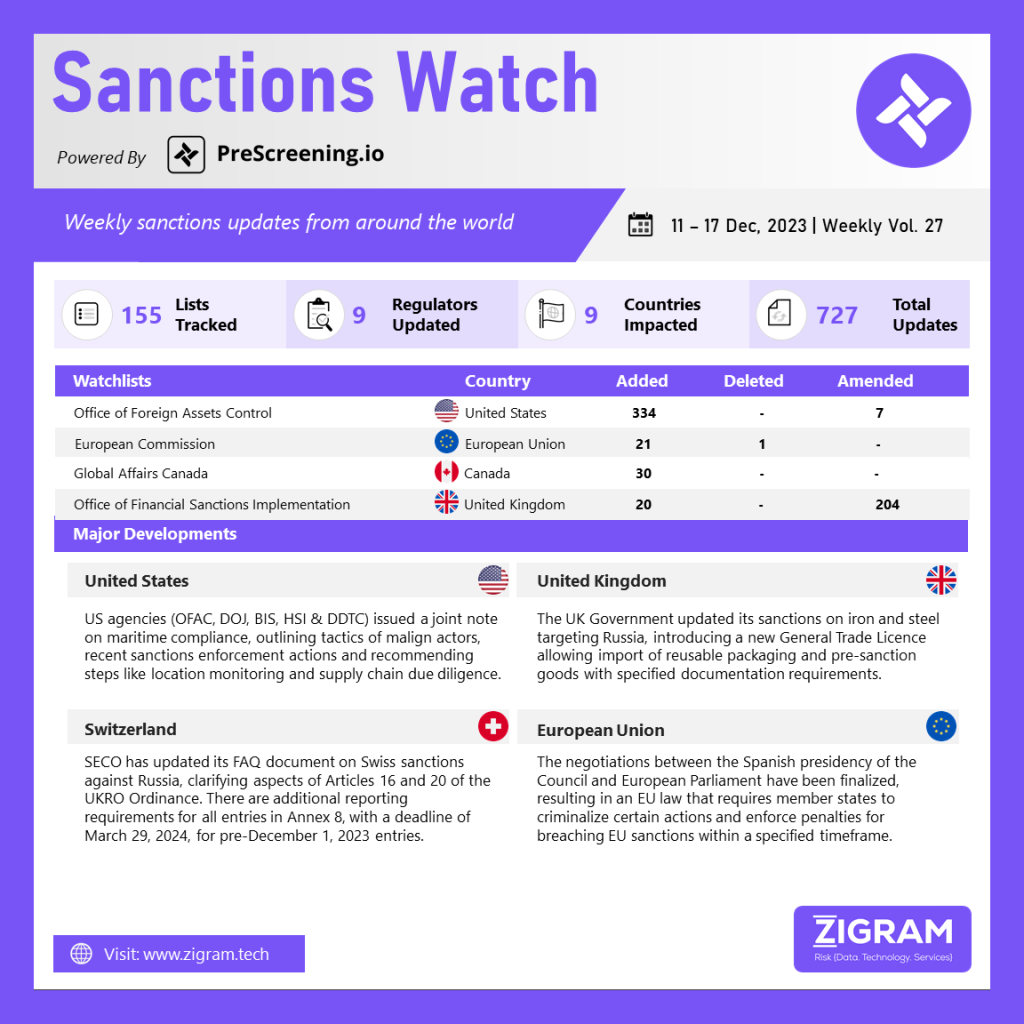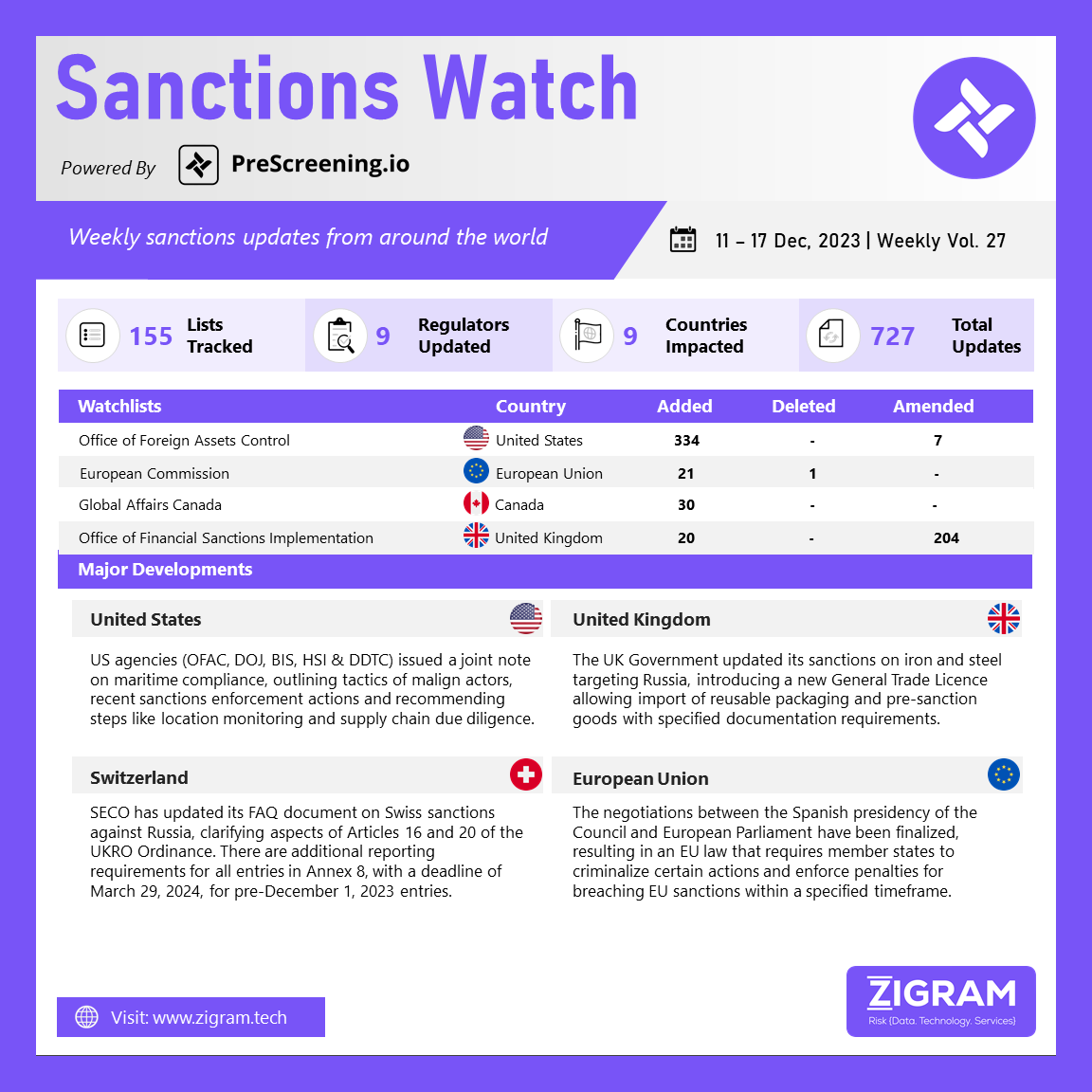Published Date:
In the latest edition of our Sanctions Watch weekly digest, we present significant updates on sanction watchlists and regulatory developments.
The Department of Justice (DOJ), the Department of Commerce’s Bureau of Industry and Security (BIS), the Department of Homeland Security’s Homeland Security Investigations (HSI), the Department of State’s Directorate of Defense Trade Controls (DDTC), and the Department of the Treasury’s Office of Foreign Assets Control (OFAC) jointly released a compliance note. This document emphasizes the tactics used by malign actors in the maritime and transportation sectors, along with recent enforcement actions in response to alleged violations of United States sanctions and export controls. Additionally, the note provides guidance on steps that the maritime and transportation industries can adopt to maintain compliance with U.S sanctions and export controls.
The United Kingdom Government has recently made updates to its Notice to Importers, introducing a new General Trade Licence and revising guidance related to sanctions on iron and steel from Russia. In April 2023, sanctions were imposed, prohibiting the import of iron and steel processed in a third country (excluding the United Kingdom, Isle of Man, or Russia). These restrictions, effective since September 30, 2023, require traders to furnish documentation proving a good’s supply chain compliance. According to the updated guidance, acceptable evidence includes Mill Test Certificates, invoices, certificates of origin from chambers of commerce, bills of lading, or CMR transport documents. Additionally, the new General Trade Licence permits the import of reusable packaging, pre-sanctioned goods, and items in free circulation in the UK pre-sanctions. Effective from December 11, 2023, with no specified end date, users must notify the Secretary of State for the Department for Business and Trade within 30 days of first use and adhere to record-keeping obligations.
The “frequently asked questions” (FAQ) document from the State Secretariat for Economic Affairs (SECO) has been updated, offering improved clarity on certain aspects of Articles 16 and 20 of the Ordinance related to measures in connection with the situation in Ukraine (“UKRO”). Notably, there is an additional transactional reporting requirement that applies to all entries in Annex 8, including pre-existing ones that were previously reported to SECO. The deadline for compliance with this requirement is March 29, 2024, for entries made before December 1, 2023.
The Spanish presidency of the Council and the European Parliament, have reached a political agreement on a European Union (EU) law that criminalizes the violation of EU sanctions. This directive establishes criminal offenses and penalties for individuals or entities that breach or evade EU sanctions, ensuring their prosecution. The significance of this law is heightened in the context of the Russian war of aggression against Ukraine. Member states are mandated to define specific actions as criminal offenses, encompassing activities such as aiding those subjects to EU restrictive measures in bypassing travel bans, trading sanctioned goods, engaging in transactions with entities under EU restrictions, providing prohibited financial services, and concealing ownership of funds tied to EU-sanctioned individuals or entities. Additionally, inciting, aiding, and abetting these offenses will be punishable. Notably, the law extends criminal liability to the intentional or seriously negligent trade of war material.
- #UnitedKingdom
- #UnitedStates
- #OFAC
- #DOJ
- #BIS
- #HomelandSecurityInvestigations
- #DirectorateofDefenseTradeControls
- #Compliance
- #ExportControl
- #Russia
- #SanctionsWatch
- #RegulatoryCompliance
- #TradeCompliance
- #SanctionsEnforcement
- #GeneralTradeLicence
- #DepartmentforBusinessandTrade
- #StateSecretariatforEconomicAffairs
- #FAQ
- #Articles
- #RedFlags
- #EuropeanUnion
- #TravelBan

